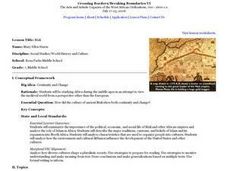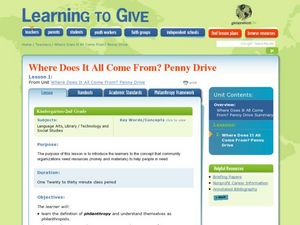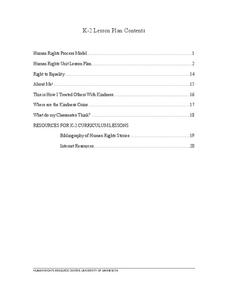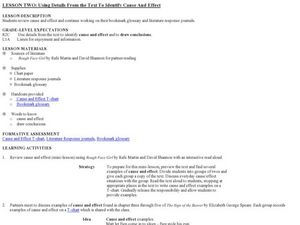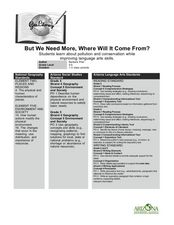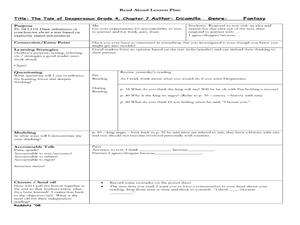Curated OER
Mali
Seventh graders begin the lesson by reading primary sources about the country of Mali. Using maps drawn in the past, they discuss what they can gather about the country from the map and how it has changed over time. They use a graphic...
Curated OER
The Polar Express
Learners read The Polar Express.They prepare a painting on KidPix that shows what they predict The Polar Express will be about. They show their paintings and tell what they feel the story is about and discuss why it is important to...
Curated OER
Where Does It All Come From?
Learners analyze a reading selection. In this community lesson, students read a story about how community helps a family in need. Learners discuss their community organizations and how they help those in need.
Curated OER
Where In the World Are We?
Fifth graders read postcards and find their locations on maps. They use the pictures and text on the postcards to write about imaginary vacations. They compute the mileage and compare it to TripMaker data.
Curated OER
Click, Clack, Moo: Electric Blanket Science
Students read Click, Clack, Moo: Cows That Type by Doreen Cronin and discuss the similarities and differences between electric blankets and regular blankets. They brainstorm a list of reasons why the farm animals wanted electric blankets.
Curated OER
Nursery Rhymes
Young scholars recall details of nursery rhyme read by teacher, identify main characters, and demonstrate knowledge of poem by creating concept map about story that includes title, clip art, and changes in font and color.
Curated OER
Cause and Effect
Students identify cause and effect relationships in a short story. After reading a short story, they participate in a discussion of how one event in a story can lead to several others. Students are then paired for a matching task that...
Curated OER
Weed Management Conflict
Students read and discuss conflict resolution scenario relating to weed management, role play members of different interest groups, prepare presentations and present to City Commissioners, and choose best land-use option.
Curated OER
Human Rights
Young scholars explore human rights, kindness and equality. Through a series of lesson plans included in this unit, students discover how to create a caring school climate. They read stories, write in journals, role play equality and...
Curated OER
It's Your Opinion
Students view "Inkheart: Speak Your Mind" by Cornelia Funke. They read several letters to the editor of a local newspaper and underline the 'opinion' portions of the letters. They discover how a literary selection can expand personal...
Curated OER
What’s in a Name? Understanding Malcolm X
Students study the life of Malcolm X. For this autobiography lesson, students read The Autobiography of Malcolm X, investigate and evaluate the time period of his life, and write an essay based on their reflections pertaining to his...
Curated OER
The Constitution: Drafting a More Perfect Union
Students analyze an unknown primary source document to determine its origin. In this Constitution lesson, students read primary source documents and contrast and compare the evolution of the drafts of the Constitution. Students analyze...
Curated OER
Weather "Why"
Students research weather and explore how to use their research information. In this weather information lesson, students visit a given website for weather forecasts. Students graph the weather, sing weather songs and select a class...
Curated OER
Leaf Patterns
First graders explore the existence of patterns in everyday items. In this science and math integrated instructional activity, 1st graders match leaves with a name word card and organize them into four patterns. This instructional...
Curated OER
This Guilty Land
Students read and discuss several informational cards about John Brown, the historical context he lived in and his abolitionist cause. They complete a character chart and write an epitaph that conveys their opinion of his actions.
Curated OER
Reindeer Herders
Students examine the life of of nomadic herders in Siberia. They read and discuss an article and maps from National Geographic, identify threats to this way of life, and write a letter to the Russian government identifying ways to...
Curated OER
The Stinky Cheese Man and Other Fairly Stupid Tales
Sixth graders demonstrate the ability to process and evaluate content from a variety of sources and apply comprehension skills to the material read. They organize information for practical use and design and develop an informational...
Curated OER
Are You Thirsty? The Effects of Pollution on Drinking Water
Discuss the availability of clean, plentiful water and the causes of water pollution. In groups, sixth graders discuss problem-solving methods for keeping water clean. They explore the function of water treatment plants and perform...
Curated OER
Thanksgiving Mourning
Students examine the way diverse groups can perceive a shared experience in a dramatically different light. Students read commentary written by Native American writers and find examples of different points of view. Students...
Curated OER
Using Details From the Text To Identify Cause and Effect
Learners word in groups to come up with cause and effect situations based on texts they are reading. For this cause and effect lesson plan, students record these in their literary response journals.
Curated OER
Draw your Conclusions
Young scholars analyze data from a student discussion website and write a report on the outcome of an investigation regarding their local water quality. As part of a larger unit students then post the summary of their investigation on...
Curated OER
Reflections on Poetry Readings
Eighth graders design and compile a booklet of published and original poems reflective of a specific theme.
Curated OER
But We Need More, Where Will It Come From?
Students write a persuasive letter and create a poster about pollution and conservation. In this pollution and conservation lesson plan, students learn how humans are the number 1 cause of pollution.
Curated OER
The Tale of Despereauz
Fourth graders read text and draw inferences or conclusions about the text. In this reading lesson, 4th graders discuss their opinions on what was read and state why they think that way to a partner.


